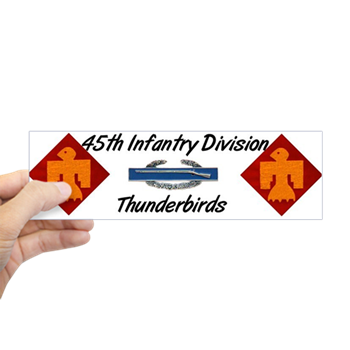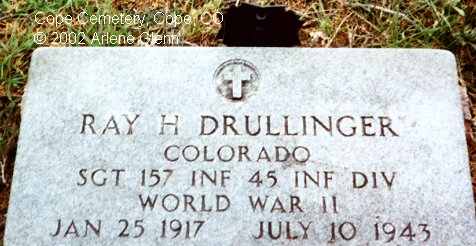Sgt Ray Hackney Drullinger |



Content and Photographs used with the
permission of the Yuma Museum P.O. Box 454, Yuma, Co. 80759. Exerpt from The
Rock of Anzio used with the permission of author, Flint Whitlock.
Edited
by Eric Rieth
| The troops spent the next ten days exercising, eating, and sightseeing to limber up after being crammed in the ship during the Atlantic crossing. The 45th piled back onto the thirty ships of their convoy and headed for the shores of Sicily. The day before invasion (known as D minus 1)a gale-force storm ripped into the convoy. It seemed that everyone including the sailors were sick. "Down in the Bottom of the ship where the men were, it was an inch deep in vomit" recalled a LT. | |
|
View from USS Leonardwood of beach landings |
At 0330 hrs, 10 July 1943 Operation Husky was under way (Map of Sicily). Flint Whitlock in his book, The Rock of Anzio, describes the thoughts and mood of the soldiers that morning as follows: "With the ships anchored at their stations offshore, the men quietly assembled on deck as they had done so many times before during practice landings. Only this time, it was different. This time, it was for real. The first landing on a hostile shore is always the easiest-and the most difficult. Easy because each soldier is a neophyte, a virgin to combat. The noise and confusion and horror of war are still incomprehensible, no more real than a training film. Although fear is running high, so is the excitement and elation of actually, finally, putting years of training to use. And difficult simply because the unknowns are overwhelming: How will I react to combat? How will my squad perform? my platoon? my company? my battalion? my regiment? my division? my army? Will I chicken out or will I hold my own? Will we land on the right beach? What happens if we don't? Do I have enough ammunition? |
| What if my rifle jams? Where are my grenades, my bayonet, my cigarettes? What if I'm hit? Will I lose a leg? Will there be a medic nearby? Will I die? And so it went, private thoughts creasing each man's forehead as he looked toward land, watching the bright blossoms that flamed on shore with each round of naval fire, feeling the crump of the explosions against his eardrums several seconds after the visual display, waiting for the order to finally move from the comforting security of the mother ship into the bobbing landing craft several stories below. Nerves were stretched tight, mouths were too dry even to salivate, and many stomachs and intestines were in a state of distress." (pgs. 38-39) Ray, who was now a Sergeant, and the other men from his platoon must have felt some or all of those feelings and questions, as they boarded their landing craft. The water was still rough and it was tough going getting into the boat, rising up and dropping down, below as they climbed down the nets. The first Thunderbirds ashore were surprised by the ease of landing on the beach. Of course it was not all smooth sailing. Two landing craft ran into each other and sank, killing thirty eight men. Most of these men were from F Company, 157th, Ray's Company. On August 14th, Mr. and Mrs. Drullinger had started on a business trip to Benkleman, Nebraska; Saturday morning, but at Wray, they encountered tire trouble and were forced to return home where a telegram was waiting; "Sgt. Ray H. Drullinger, was Killed in action, in the invasion of Sicily on Saturday, July 10, 1943." Sgt. Drullinger was the first Washington County boy to lose his life in action with the army of the United States. Thursday
September 16, 1943 The Akron News-Reporter | |
Thursday August 12, 1948 The Otis Independent
|
 |
last revision